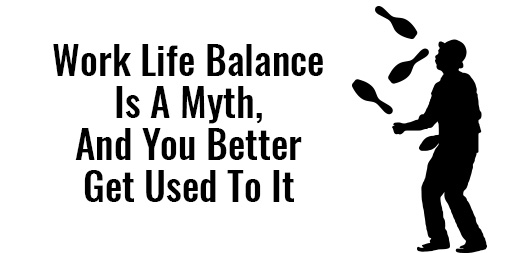 As I have grown as an employee and into a manager role, I have learned that you have to get rid of this mindset of work life balance. It is a plague that keeps you trapped as an employee with a mindset of an employee.
As I have grown as an employee and into a manager role, I have learned that you have to get rid of this mindset of work life balance. It is a plague that keeps you trapped as an employee with a mindset of an employee.
Here’s what I mean, as long as you have the mindset of an employee, you will remain one. If you are thinking, ‘duh, I want to remain employed’ you are missing my point. What I strive for in my career is doing great work and continuing to grow my responsibility and opportunities to provide value for an organization. I prefer to do this proactively than do it reactively. Reactive work means that I am not choosing where and how to grow. This result is someone else controls the situation for me and tells me how to grow.
I don’t ever want to be letting someone else dictate growth for me. This doesn’t mean that I don’t want to learn from organizations. In fact, it means I can learn a lot from organizations but it means that I ultimately allow them to train me, with the emphasis on my choice to be trained.
Every employee puts up with things that are not related to providing value or are not fun. This can be for years where you are learning basic fundamentals. Everyone does reactive work. But not everyone does ONLY reactive work. Those that think about work in a proactive way are the ones that are learning and growing, they have the potential to drive the company forward. They learn new things and grow faster than those that work reactively.
Trading Work Life Balance for Margin
Working only reactively is doing work required of you in the job. It is what you are getting paid for but it is not how you grow and improve and show that you are valuable. This is where your mindset kicks in regarding work life balance. People that want to do great work and not just reactive work do the work required of the job and then some. In order to do great things and get compensated for it you need to make more connections and challenge an organization to do better and think differently.
This growth takes time, to learn skills both task oriented and people oriented. It takes time to understand how to communicate what you are learning, what you know, and what you feel. That’s why it’s so important to consider the pace of your moments, days, months, and years. You don’t need work life balance, you need to create margin in your regular rhythms for priorities that matter in your life.
The type of insights required to be a strong employee require an overlap of work and non-work hours. This doesn’t mean you need to be in the office for over 40 hours a week. You need breaks from doing production work and opportunities to do something different and make connections that relate back to your work. You also need to take time to rest, relax, play, be with people, and worship.
Connections come from all aspects of our life. We cannot continue to separate our home from our work from our spiritual from our physical. We cannot spend 70 hours a week working and not neglect other priorities in our life. In order to do proactive work, you must think proactively by prioritizing what is most important to you. For example, great insights and connections happen when you’re at home playing with the kids, in the shower, mowing the lawn, or playing in the pool. If you are working reactively, you are turning your brain off when not at work.
This is what a work life balance mindset did for me. It made me believe that I deserved to not do work. It was a factor in bad work performance when I was at work because I did not care. I did not take it seriously because I thought I deserved to be paid, that companies owed me something whereas I really just wanted to play music or do other things. My mind was not in the work.
For years I worked at companies that I hated. I thought the value I provided was pointless and so I did the work that I needed to do and then I went home and disconnected my brain from my job. Whatever gaps I noticed in my own ability or thinking, I tried to learn and grow in whatever way I knew how. In some cases this was learning a new skill that seemed more interesting than what I was doing at work. In others, it was reading to find answers about gaps in my thinking and particularly why work wasn’t going well for me and what I could do to improve. In these situation, I was reactive at work and proactive in every other place. At times, this is what makes sense for anyone. The job is a job to you and nothing else. It is simply an exchange of services for pay. And that is perfectly acceptable for a season. Just know, that if you want to grow and improve in the future of our working world, you need to be doing more than just the work you are paid to do.
You cannot just do the work required of you if you want to do great work. In that way, you must take your work home with you. At some point, your efforts at learning new skills outside of work and the work you do at work might start seeing more connections and becoming synonymous. This may be what you get paid for. This is when you know that you are on to something unique. This is when your work can even become fun for you. You might even find yourself getting up early in the a.m. or staying up late in the night because you can’t sleep due to an interesting project or learning experience. You are becoming something greater than the regular worker.
This motivation that comes from interest in doing good work is when you have a unique opportunity to find work that pays you well or your company will realize your efforts and increase your pay. If they don’t, it is your opportunity to practice communicating with confidence and clarity. Keep looking for opportunities where you can grow and learn in your life and create appropriate margin in your rhythms. In this way, you can slowly throw off the shackles of work-life balance and over time, do work better because you love it. It is a life with work and play and family and faith all mixed in.
In this world of providing great value at work has the potential for more choices. You can choose more time freedom, more pay, or something else. You become personally responsible for creating margin, aka space, for yourself to process things away from work so that you can come back to the work and do great work. This is the way of to reject work-life balance and replace it with work margin. And it is the way to carve out doing work that matters. Some days it might even feel like your work doesn’t feel like work. It is starting to become an extension of who you are and molding you into who you are becoming.

